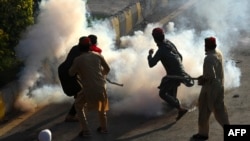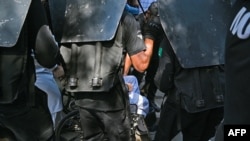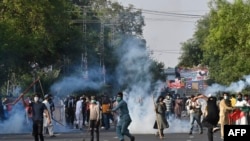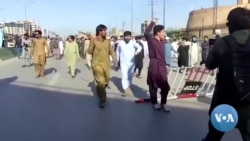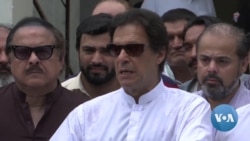Authorities in Pakistan Tuesday arrested former prime minister Imran Khan, the leader of the largest national political party, outside a court in the capital, Islamabad.
The 70-year-old politician was taken into custody as he prepared to attend a hearing on the dozens of charges against him ranging from alleged terrorism and corruption to treason and other criminal offenses.
Khan's attorneys claimed that paramilitary forces physically assaulted him before taking him into custody and handing him over to anti-graft authorities accompanying them.
Khan’s party denounced their leader’s arrest.
“State terrorism - breaking into IHC (Islamabad High Court) premises to abduct Imran Khan from court premises. Law of the jungle in operation. Rangers beat the lawyers, used violence on Imran Khan, and abducted him,” tweeted Shireen Mazari, a close aide to the opposition leader, along with a purported video of security action.
Pakistan Interior Minister Rana Sanaullah confirmed Khan's arrest, rejecting charges of physical assault and telling local media about a corruption case against the opposition politician.
Nationwide protests
PTI supporters immediately took to the streets in Islamabad and other parts of the country to protest the arrest. Police in Islamabad dispersed protesters and detained dozens of them in the process.
Protesters and eyewitnesses reported firing by security forces at men and women outside army and ISI installations in several cities, injuring many protesters.
A large number of Khan supporters gathered outside the military headquarters in Rawalpindi and chanted slogans against the army, something that has not been seen in the recent history of Pakistan.
Meanwhile, provincial authorities in Lahore deployed paramilitary forces to assist police in controlling the situation after protesters there assaulted the residence of the regional military corps commander.
Angry protests and demonstrations also erupted across the Khyber Pakhtunkhwa province abutting Afghanistan.
There was a complete media blackout of the protests on dozens of local news channels in and around Islamabad, but officials were not immediately available to respond to opposition allegations the government was responsible. The violence prompted authorities to immediately ban all gatherings in major cities
Adam Weinstein, a researcher at Washington’s Quincy Institute, said, “The arrest of Imran Khan takes an already escalating political firestorm & douses it with petrol as the nation inches off an economic cliff.”
Watch related video by Sarah Zaman:
“It will harden negative views toward the military & PDM and unleash chaos in the streets. But it is also a blow to IK,” he wrote on Twitter.
The arrest came just hours after Khan added new details to his allegation that a senior general within the Pakistani military spy agency, the Inter-Services Intelligence or ISI, is plotting to kill him.
The opposition leader warned such an eventuality could plunge the South Asian nation of about 220 million people into a turmoil worse than Sri Lanka's political unrest last year.
The head of his Pakistan Tehreek-e-Insaf (PTI) party first made the claims in a video statement a day after the powerful military warned Khan against making what it condemned as "fabricated and malicious" allegations.
Khan was injured in an assassination attempt last November while leading an anti-government protest march near Lahore, the capital of Punjab, Pakistan's most populous province. The attack killed one person, while the PTI chief received bullet wounds in his legs.
Khan accused ISI's Major-General Faisal Naseer of being one of the planners of the assassination attempt.
Government officials have said the assassination attempt was the work of a lone gunman, who is now in custody and confessed in a video controversially leaked to the media.
Former prime minister Khan was removed from office in a parliamentary vote of no-confidence in April 2022, a move he rejected as illegal and orchestrated by the now-retired chief of the Pakistani military, General Qamar Javed Bajwa.
Pakistan is mired in an economic and political crisis, with the Khan-led PTI pressuring Sharif's embattled coalition government to hold early elections.
The military has a long history of direct and indirect political intervention, with political parties and independent analysts blaming the institution for the fragility of the country's democracy. Army generals have staged several coups and arrested politically popular prime ministers on trumped-up treason and other charges, ruling the country for nearly half its 75 years.
"Today it appears the Pakistan army has reached an "enough is enough" moment re Khan. After several false starts/unsuccessful arrest attempts by the police, this time the mil took matters into its own hands. What a mess," tweeted Michael Kugelman, the South Asia Institute director at the Wilson Center.
Maleeha Lodhi, the former Pakistani ambassador to the United States, while responding to Khan's arrest, described the current crisis facing the country as unprecedented.
"Of total political chaos and economic breakdown. This is untenable, and the people of the country don't deserve this. This must change," Lodhi wrote on Twitter.




